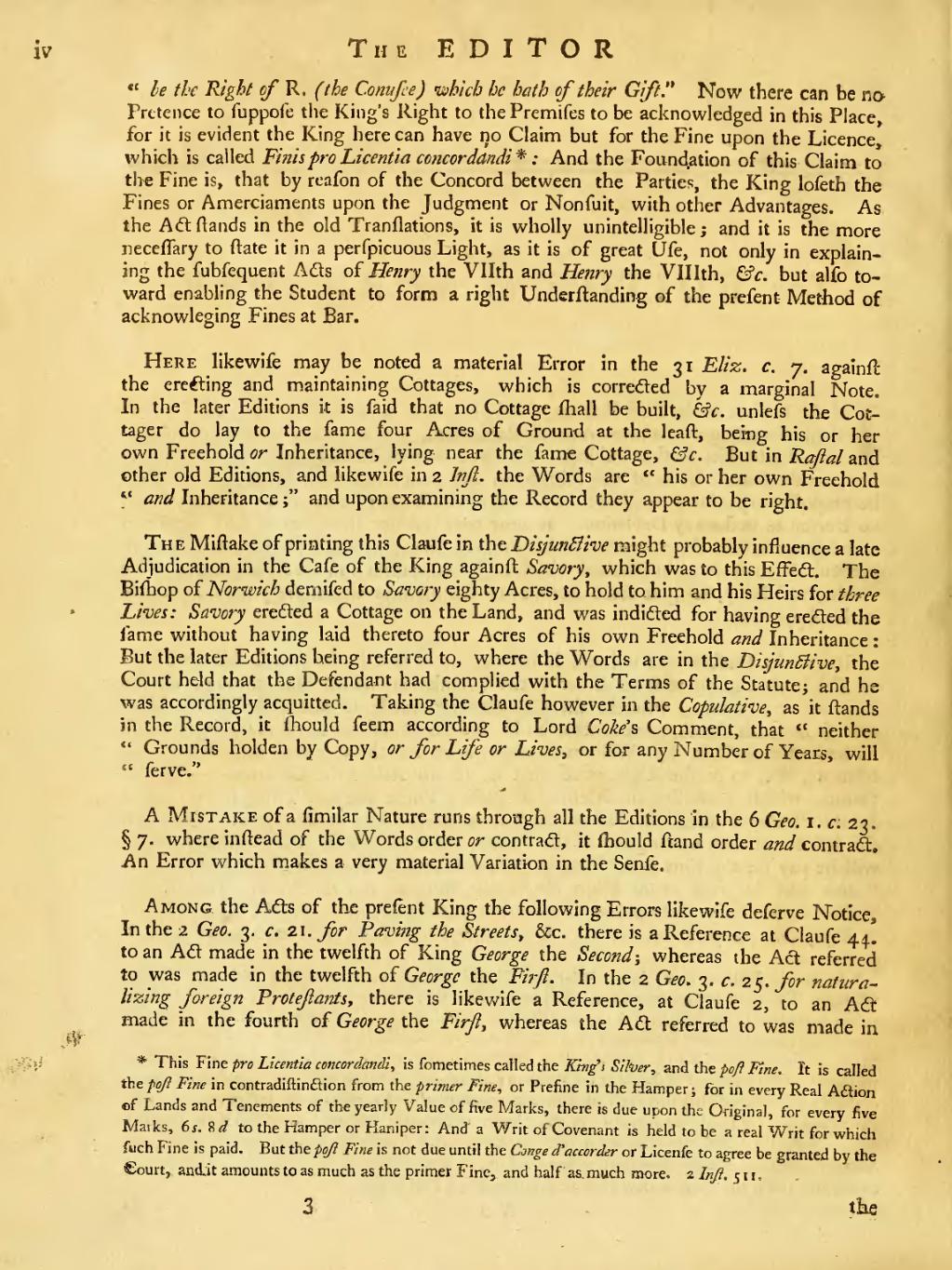be the Right of R. (the Conusee) which he hath of their Gift." Now there can be no Pretence to suppose the King's Right to the Premises to be acknowledged in this Place, for it is evident the King here can have no Claim but for the Fine upon the Licence, which is called Finis pro Licentia concordandi[1]: And the Foundation of this Claim to the Fine is, that by reason of the Concord between the Parties, the King loseth the Fines or Amerciaments upon the Judgment or Nonsuit, with other Advantages. As the Act Stands in the old Translations, it is wholly unintelligible; and it is the more necessary to state it in a perspicuous Light, as it is of great Use, not only in explaining the subsequent Acts of Henry the VIIth and Henry the VIIIth, &c. but also toward enabling the Student to form a right Understanding of the present Method of acknowleging Fines at Bar.
Here likewise may be noted a material Error in the 31 Eliz. c. 7. against the erecting and maintaining Cottages, which is corrected by a marginal Note. In the later Editions it is said that no Cottage shall be built, &c. unless the Cottager do lay to the same four Acres of Ground at the least, being his or her own Freehold or Inheritance, lying near the same Cottage, &c. But in Rastal and other old Editions, and likewise in 2 Inst. the Words are "his or her own Freehold and Inheritance;" and upon examining the Record they appear to be right.
The Mistake of printing this Clause in the Disjunctive might probably influence a late Adjudication in the Case of the King against Savory, which was to this Effect. The Bishop of Norwich demised to Savory eighty Acres, to hold to him and his Heirs for three Lives: Savory erected a Cottage on the Land, and was indicted for having erected the same without having laid thereto four Acres of his own Freehold and Inheritance: But the later Editions being referred to, where the Words are in the Disjunctive, the Court held that the Defendant had complied with the Terms of the Statute; and he was accordingly acquitted. Taking the Clause however in the Copulative, as it Stands in the Record, it should seem according to Lord Coke's Comment, that "neither Grounds holden by Copy, or for Life or Lives, or for any Number of Years, will serve."
A Mistake of a similar Nature runs through all the Editions in the 6 Geo. 1. c. 23. § 7. where instead of the Words order or contract, it should stand order and contract, An Error which makes a very material Variation in the Sense.
Among the Acts of the present King the following Errors likewise deserve Notice, In the 2 Geo. 3. c. 21. for Paving the Streets, &c. there is a Reference at Clause 44. to an Act made in the twelfth of King George the Second; whereas the Act referred to was made in the twelfth of George the First. In the 2 Geo. 3. c. 25. for naturalizing foreign Protestants, there is likewise a Reference, at Clause 2, to an Act made in the fourth of George the First, whereas the Act referred to was made in
- ↑ This Fine pro Licentia concordandi, is sometimes called the King's Silver, and the post Fine. It is called the post Fine in contradistinction from the primer Fine, or Prefine in the Hamper; for in every Real Action of Lands and Tenements of the yearly Value of five Marks, there is due upon the Original, for every five Marks, 6 s. 8 d. to the Hamper or Haniper: And a write of Covenant is held to be a real Writ for which such fine is paid. But the post Fine is not due until the Conge d' accorder or License to agree be granted by the Court, and it amounts to as much as the premier Fine, and half as much more. 2 Inst. 511.
